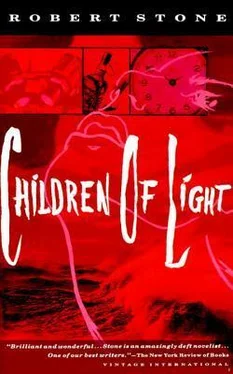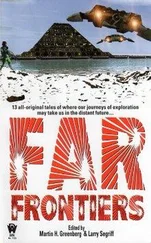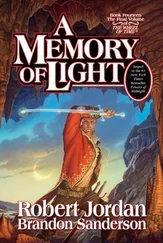Robert Stone - Children of Light
Здесь есть возможность читать онлайн «Robert Stone - Children of Light» весь текст электронной книги совершенно бесплатно (целиком полную версию без сокращений). В некоторых случаях можно слушать аудио, скачать через торрент в формате fb2 и присутствует краткое содержание. Год выпуска: 1992, Издательство: Vintage, Жанр: Современная проза, на английском языке. Описание произведения, (предисловие) а так же отзывы посетителей доступны на портале библиотеки ЛибКат.
- Название:Children of Light
- Автор:
- Издательство:Vintage
- Жанр:
- Год:1992
- ISBN:нет данных
- Рейтинг книги:4 / 5. Голосов: 1
-
Избранное:Добавить в избранное
- Отзывы:
-
Ваша оценка:
- 80
- 1
- 2
- 3
- 4
- 5
Children of Light: краткое содержание, описание и аннотация
Предлагаем к чтению аннотацию, описание, краткое содержание или предисловие (зависит от того, что написал сам автор книги «Children of Light»). Если вы не нашли необходимую информацию о книге — напишите в комментариях, мы постараемся отыскать её.
Children of Light — читать онлайн бесплатно полную книгу (весь текст) целиком
Ниже представлен текст книги, разбитый по страницам. Система сохранения места последней прочитанной страницы, позволяет с удобством читать онлайн бесплатно книгу «Children of Light», без необходимости каждый раз заново искать на чём Вы остановились. Поставьте закладку, и сможете в любой момент перейти на страницу, на которой закончили чтение.
Интервал:
Закладка:
They drove into the center of Villa Carmel with two other passengers — Benson and an American in a straw sombrero who had been lounging about the hangar and who never glanced at them. In the course of the brief ride, Walker underwent a peculiar experience. He was examining what he took to be his own face in the rearview mirror, when he realized that the roseate, self-indulgent features he had been ruefully studying were not his own but those of the man in the seat in front of him. His own, when he brought them into his line of sight, looked like a damaged shoulder of beef. The odd sense of having mistaken his own face remained with him for some time thereafter.
When they pulled into the little ceiba-shaded square of Villa Carmel, Benson and the American got out and the driver looked questioningly toward Lu Anne and Walker.
“Tell him the shrine,” Lu Anne said.
Walker tried the words he knew for shrine— la capilla, el templo. The elderly driver shrugged and smiled. His smile was that of the man at the airport, a part of the local Indian language.
“Monte Carmel,” Lu Anne said firmly. “ Queremos ir ahí. ”
Without another word, the driver shifted gears and then circled the square, heading back the way they had come.
They drove again past the airstrip and followed the indifferently surfaced road into the mountains. As they gained distance they were able to turn and see that the town of Villa Carmel itself stood on the top of a wooded mesa. The higher their minibus climbed along the escarpment, the deeper the green valleys were that fell away beside the road. They passed a waterfall that descended sheerly from a piñon grove to a sunless pool below. Vultures on outstretched motionless wings glided up from the depths of the barrancas, riding updrafts as the sun warmed the mountain air.
When they were almost at the top of the ridge, the minibus pulled over and halted at the beginning of a dirt track. They could see across the next valley, which was not wild like the one from which they ascended but rich with cultivation. A railroad track ran across its center. There were towns, strung out along a paved highway. Miles beyond, another range of mountains rose, to match the range on which they stood.
“We’ve been here,” Walker said to Lu Anne. “Haven’t we?” He got out of the bus and walked to a cliffside. “We stayed in that valley, at a hot springs there. You were working in these hills. Or else,” he said, nodding across the valley, “in those.”
Her attention was fixed on a winding rocky pathway that led up a hillside on their right, toward the very top of the hill. Walker saw her question the driver, and the driver, smiling as ever, shake his head. He walked back to the bus.
“Is he saying,” Lu Anne asked, “that he can’t drive us up there?”
Walker spoke with the driver and determined that, indeed, the man was cheerfully declining to take them farther.
“He says he can’t make it up there,” Walker told Lu Anne. “He says the bus wouldn’t go up.”
Looking the track over, Walker saw that it appeared to be little more than a goat trail, hardly a road at all.
“Pay him,” Lu Anne said.
He had nothing smaller than a twenty. Shamefacedly he put it in the driver’s hand. The driver responded with no more than his customary smile.
“I want him to come back this evening,” Lu Anne said.
When Walker suggested this to the driver, the driver said that it would be dangerous for them to spend the day in the mountains alone. There were bad people from the cities, he said, who came on the highway and did evil things.
“We won’t be near the highway,” Lu Anne said.
So Walker asked the man to return before sundown and the man smiled and drove away. Walker suspected they would never see him again.
Lu Anne walked across the road to the foot of the path.
“Hey, bo,” she said. “Don’t you know we’re going up?”
Walker knew. He fell into step with her.
“The next hill,” he said to her when they had gone a way, “that never was a thing that troubled me.”
“No,” Lu Anne said.
“I was always hot for the next hill. Next horizon. Whatever there was. That’s why I came along now.”
He paused, looked around and took a pinch. It was very wasteful. When he had satisfied himself, he took a drink of bottled water. Lu Anne took some cocaine from him.
“Yes,” she said. “You’re Walker.”
“They don’t call me Walker for nothing,” Walker said. “It’s a specialty.”
“Of what does it consist?” Lu Anne said.
“Well,” he said, “there’s the road. And there’s one.”
“And how does one approach the road?”
“One steps off confidently. One in front of the other. Hay foot, straw foot. Briskly.”
“Oh,” Lu Anne said, “that’s you, Gordon. That’s your style all right.” She linked arms with him. “Tell us more.”
“Well,” he said, “there are things to know.”
“I knew there would be. Tell.”
“There’s to and fro. There’s back and forth. There’s up. Likewise down. There’s taking care of your feet.”
“And the small rain,” Lu Anne said.
“And mud. And gravel and sand. And shit. And wet rot and dry rot. And going over fences.”
“Can you look back?”
“Never back. You can look down. You have to see where you’re going.”
“But is there a place for art?” Lu Anne asked with a troubled frown. “It’s all so functional.”
“There’s whistling. That’s the principal art. The right tunes in the right places. Whatever gets you through the afternoon.”
“How sad,” Lu Anne said. They walked on, winding upward along the hillside. “How sublime.”
“The road is never sublime,” Walker told her. “The road is pedestrian.”
When they had walked for half an hour, they could see both valleys — the plains to the east and the forested barranca through which they had come.
They stopped to drink the rest of their water and take more of the drug. The road over which they had driven ran close to the summit; the top of Monte Carmel was only a quarter mile or so above them.
“Your road is mine, Walker,” she told him.
“Right,” he said. He glanced at her; she was clutching the collar of the army shirt she had thrown on after the party. Her eyes were bright with pain.
“It was always me for you.”
“I knew that,” he said. He was thinking that, of course, they would never have lasted three months together by the day. Arrivals, departures, fond absences and dying falls were all there had ever been to it. Bird songs and word games, highs and high romance. “We weren’t free.”
“Oh, baby,” she said, “there ain’t no free.”
“Only,” Walker said, “the comforts of philosophy.”
“Which in your case,” Lu Anne said, “is me.”
Walker laughed and so did she.
“Likewise the consolations of religion,” Lu Anne said, “which is why we are out here …”
“Under the great vault of heaven,” Walker suggested.
“Under the great vault,” she repeated, “of heaven.” She stopped and began to cry. She knelt in the dust, her eyes upturned in absurd rapture, doing the virgin’s prayer. Walker was appalled. He bent to her.
“Can’t you help me?” she asked.
“I would die for you,” he said. It was true, he thought, but not really helpful. He was the kind of lover that Edna Pontellier was a mother. At the same moment he realized that his life was in danger and that he might well, as he had earlier suspected, have come to Mexico to die. His heart beat fearfully. His sides ached.
“I don’t require dying for,” Lu Anne said. He considered that she deceived herself. Weeping, she looked childlike and stricken, but even in his recollection she had never been more beautiful. She had grown so thin in the course of the film that her face had contracted to its essential lines, which were strong and noble, lit by her eyes with intelligence and generosity and madness. The philosophy whose comforts she represented was Juggernaut.
Читать дальшеИнтервал:
Закладка:
Похожие книги на «Children of Light»
Представляем Вашему вниманию похожие книги на «Children of Light» списком для выбора. Мы отобрали схожую по названию и смыслу литературу в надежде предоставить читателям больше вариантов отыскать новые, интересные, ещё непрочитанные произведения.
Обсуждение, отзывы о книге «Children of Light» и просто собственные мнения читателей. Оставьте ваши комментарии, напишите, что Вы думаете о произведении, его смысле или главных героях. Укажите что конкретно понравилось, а что нет, и почему Вы так считаете.












